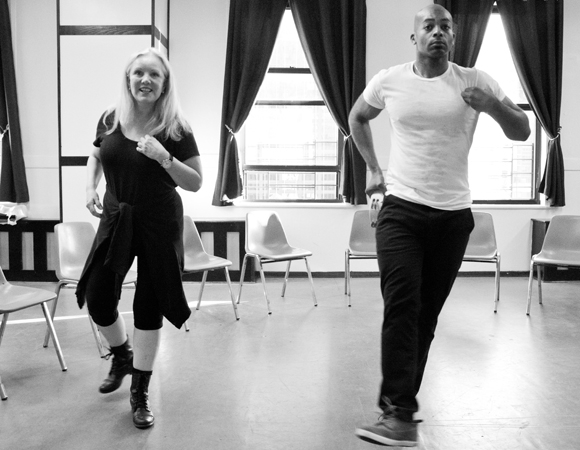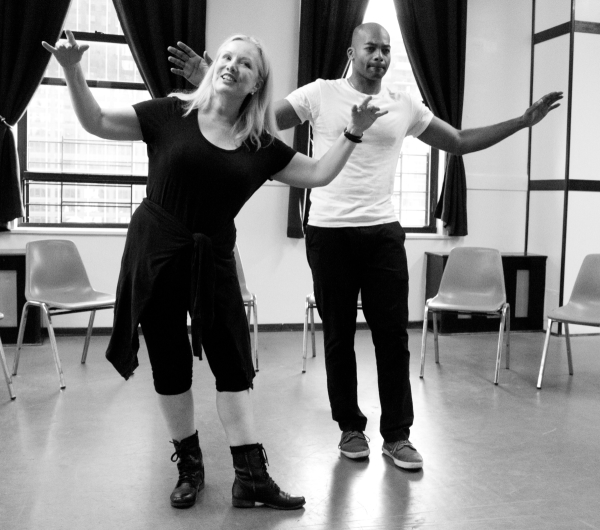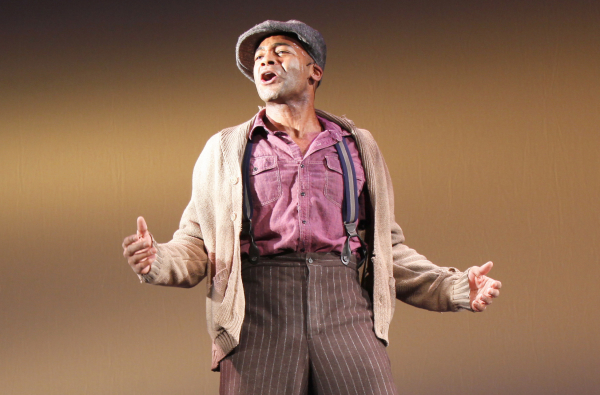Susan Stroman, Brandon Victor Dixon, and David Thompson Bring The Scottsboro Boys to London
Susan Stroman is going over dance steps with Brandon Victor Dixon as we walk into a small rehearsal room at Nola Studios. In three days' time, Dixon, late of Broadway's Motown The Musical, will head to London to begin rehearsals for the West End production of the John Kander, Fred Ebb, and David Thompson musical The Scottsboro Boys, but Stroman, the director and choreographer, wanted a few days of extra time with her leading man.
Dixon originated the role of Haywood Patterson, one of nine young black men wrongly accused of raping two white women on a boxcar train in 1931, at off-Broadway's Vineyard Theatre in 2010. He didn't follow the show to Broadway, where it played a disappointing 49 performances at the Lyceum Theatre and, despite the odds, received 12 Tony nominations (the most ever received in history for a closed show). But he's back now, ready to rejoin his fellow American original cast members Forrest McClendon, Colman Domingo, and James T. Lane, and take the show to the West End's Garrick Theatre after a sell-out run at the off-West End Young Vic.
Once the rehearsal ended, Stroman, book writer Thompson, and Dixon sat down with TheaterMania to discuss the importance of this piece, the reexploration process, and the unexpected thrill found in a Broadway disappointment.

(© David Gordon)
Brandon, why is now the perfect time to return to this show?
Brandon Victor Dixon: I was available this time…The opportunity came up and I was able to do it. We had just started Motown when we went to the Young Vic. I was backstage [at Motown] with Julius Thomas III, who was in the original company [of Scottsboro Boys] with us, and we were about to go on and Julius was like, "Man, I wish we were in London right now," and I was like, "Me, too!" And then we ran out and did the scene. It's just…we were able to make it happen now.
Susan Stroman: People's schedules are the hardest thing to deal with when you're doing a show for the second or third time. You want the people you want, but someone as in demand as Brandon is hard to get. Brandon actually inspired me for parts of the staging. It's great to just remind him of what he did to inspire me.
How did you come to the decision to use a mix of American and British performers?
Susan Stroman: I just felt it would be better to have a few Americans peppered into the company, mainly because it is a very American story. They don't have the history that we have here, so the investment is slightly different. They know about the history, but they haven't experienced it like our American cast has. There is an authenticity that our American cast brings to it…[but] the British actors really jumped on board and love the story. I've never done a show where the cast was so invested in telling that story.

(© David Gordon)
Brandon Victor Dixon: I said, when we first started rehearsals, that they had to take this thing to the West End. The level of the work is such that I knew they would appreciate it. The nature of the show, the lens through which you all decide to tell the story, is just really extraordinary. I knew the British audience would be able to appreciate the work.
David Thompson: [American actors] Forrest McClendon, Colman Domingo, and James T. Lane really built those parts, so they own it. Brandon owns that part in a way. We had the opportunity to work with him to create the show, so it's great to see the person who inspired it be able to think it over again. It's interesting to see what the British cast brings to it. They have many chapters of their own problems with racism. There were cases that people knew immediately that they could draw the correlation to make it resonate with them.
Did the fact that the Broadway run was so abbreviated come as a shock, or were you all mentally prepared for it to be a tough sell in the commercial sphere?
Susan Stroman: We were hoping for the best but not surprised when it wasn't a commercial success… but we always thought it was special. We appreciated that it did go to Broadway, because it gave it status to be done in other places. But for all of us, it was an artistic success.
David Thompson: You go to the regional theaters, where the audiences subscribe and lean into what the theater presents. It's not like it was a choice between seeing this and seeing something else down the street; this is where they're committed. Everywhere we went, they knew the story and when the show began, they leaned into it. You knew at that point the piece was going to stand up…you knew it was going to have a very long life, because the audience was there.
Brandon Victor Dixon: As a country, we like to ignore our past. We don't like to look at it. That's one of the reasons why it's not the most commercially viable show. We don't like that level of self reflection in this country. That's why we have the same debates over and over again, and why we've passed the same laws over and over again. I'm glad that we are forcing the conversation on people, because we have to continue talking about these things. Until you acknowledge that, you can't move through it.

(© Carol Rosegg)










